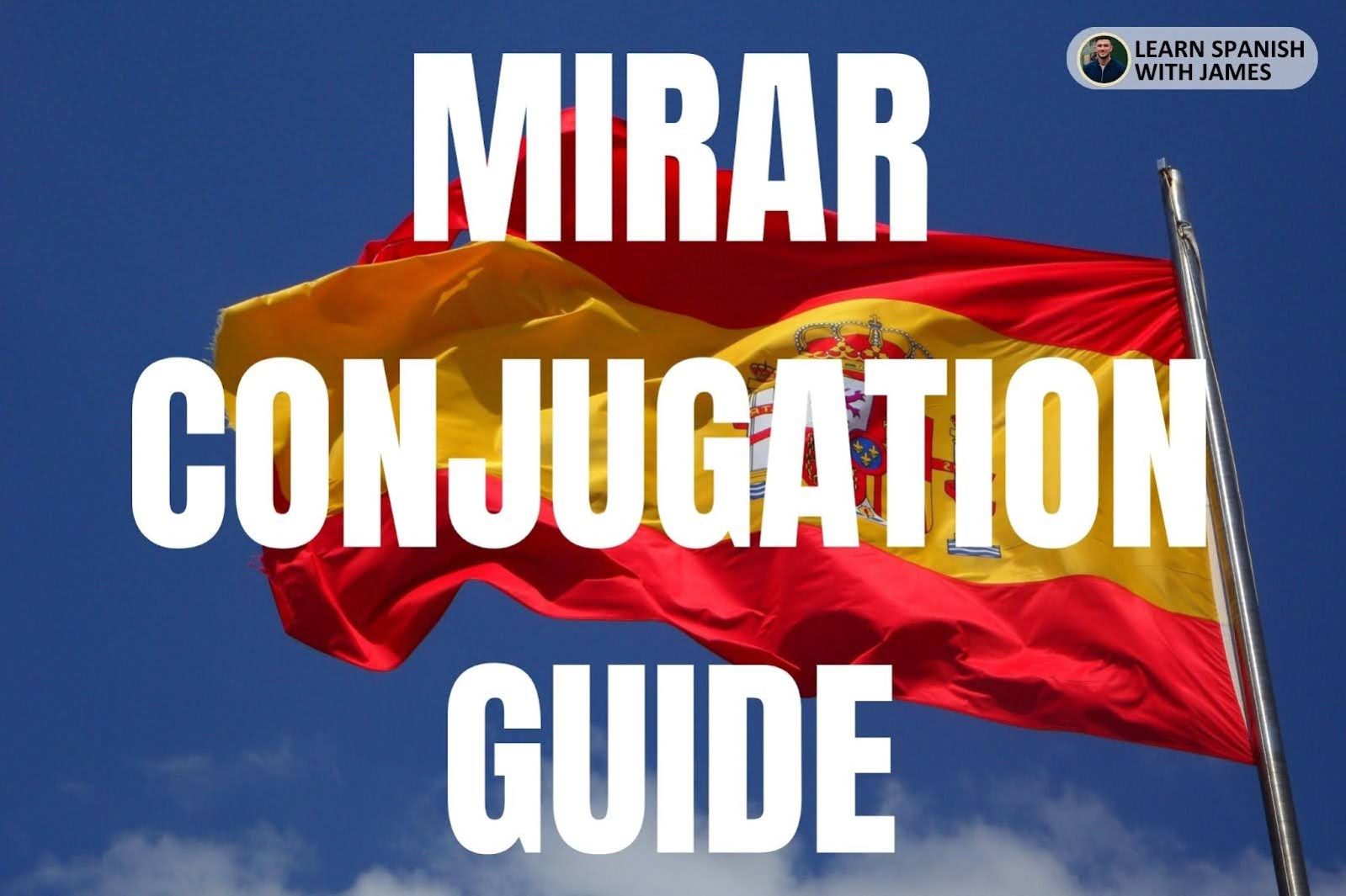Mirar Conjugation Chart & Full Tense Guide

“Mirar” is a Spanish regular -AR verb meaning “to look”.
I’m James, from Learn Spanish With James and the host of the Learn Spanish With James Podcast.
In this guide, I’ll show you how to conjugate “mirar” across various simple and compound tenses.
You’ll find a section for “encontrar” in every tense, covering all pronouns, moods and tenses.
My aim is to help you learn all about Spanish verb conjugation with ease.
Before we start, remember that “mirar” is not to be confused with “ver” – which means “to see” and “to look” in some contexts. The two verbs are not interchangeable.
Present Tense
Pronouns Pronombres Conjugation
I yo miro
you tú miras
he,she,it, you(formal) él,ella,usted mira
we nosotros,nosotras miramos
you pl. vosotros, vosotras miráis
they, you pl. (formal) ellos,ellas,ustedes miran
When We Use Present Tense
The present tense in Spanish is used to describe actions that are currently happening or habitual actions. It is one of the most commonly used tenses in the language.
The present tense ”mirar” conjugation is regular.
Examples of the Spanish verb “mirar” in the Present Tense
- Yo miro la televisión. (I watch TV.)
- Tú miras la película. (You watch the movie.)
- Él/Ella mira el paisaje. (He/She watches the landscape.)
- Nosotros miramos el partido. (We watch the game.)
- Vosotros miráis el espectáculo. (You all watch the show.)
- Ellos/Ellas miran las estrellas. (They watch the stars.)
Preterite Tense
Pronouns Pronombres Conjugation
I yo miré
you tú miraste
he, she. it, you (formal) él, ella, usted miró
we nosotros, nosotras miramos
you (plural) vosotros, vosotras mirasteis
they, you (pl. formal) ellos, ellas, ustedes miraron
When We Use Preterite Tense
The preterite tense in Spanish is used to talk about completed actions in the past.
It often describes actions that have a specific beginning and end.
When conjugating the verb “mirar” in the preterite tense, it indicates actions that were watched or looked at and are now completed.
Examples of “mirar” in the Preterite Tense
- Yo miré la película anoche. (I watched the movie last night.)
- Tú miraste el partido el sábado pasado. (You watched the game last Saturday.)
- Él/Ella miró el cuadro en el museo. (He/She looked at the painting in the museum.)
- Nosotros miramos el eclipse. (We watched the eclipse.)
- Vosotros mirasteis el documental ayer. (You all watched the documentary yesterday.)
- Ellos/Ellas miraron el amanecer. (They watched the sunrise.)
Imperfect Tense
Pronouns Pronombres Conjugation
I yo miraba
you tú mirabas
he, she, it, you (formal) él, ella, usted miraba
we nosotros, nosotras mirábamos
you (plural) vosotros, vosotras mirabais
they, you(pl. formal) ellos, ellas, ustedes miraban
When We Use Imperfect Tense
Next, we have the imperfect tense.
In Spanish, we use this tense to describe past actions that were ongoing or habitual.
It often sets the scene or provides background information in a story. So, when conjugating “mirar” in the imperfect tense, we refer to actions that were being watched or looked at in the past without a specific endpoint.
Below, I have provided some examples.
Examples of “mirar” in the Imperfect Tense
- Yo miraba las nubes cuando empezó a llover. (I was watching the clouds when it started to rain.)
- Tú mirabas las estrellas todas las noches. (You used to watch the stars every night.)
- Él/Ella miraba el mar mientras pensaba. (He/She was watching the sea while thinking.)
(“Pensaba” is from the verb “pensar“. - Nosotros mirábamos las olas mientras descansábamos en la playa. (We were watching the waves while resting on the beach.)
- Vosotros mirabais las aves en el parque. (You all were watching the birds in the park.)
- Ellos/Ellas miraban la puesta de sol cada tarde. (They used to watch the sunset every evening.)
Future Tense
Pronouns Pronombres Conjugation
I yo miraré
you tú mirarás
he,she,it, you(formal) él,ella,usted mirará
we nosotros,nosotras miraremos
you pl. vosotros, vosotras miraréis
they, you pl. (formal) ellos,ellas,ustedes mirarán
When We Use Future Tense
The future tense in Spanish is used to talk about actions that will happen in the future.
It expresses the idea that something will occur, often indicating plans or intentions.
When we conjugate “mirar” in the future tense, we refer to actions that will be watched or looked at in the future.
Again, I have provided some example sentences below.
Examples of “mirar” in the Future Tense
- Yo miraré la nueva serie cuando se estrene. (I will watch the new series when it premieres.)
- Tú mirarás las estrellas esta noche. (You will watch the stars tonight.)
- Él/Ella mirará el partido el próximo fin de semana. (He/She will watch the game next weekend.)
- Nosotros miraremos el eclipse solar. (We will watch the solar eclipse.)
- Vosotros miraréis la exposición de arte. (You all will watch the art exhibition.)
- Ellos/Ellas mirarán el desfile de moda. (They will watch the fashion show.)
Conditional Tense
Pronouns Pronombres Conjugation
I yo miraría
you tú mirarías
he,she,it, you(formal) él,ella,usted miraría
we nosotros,nosotras miraríamos
you pl. vosotros, vosotras miraríais
they, you pl. (formal) ellos,ellas,ustedes mirarían
When We Use Conditional Tense
In Spanish, the conditional tense expresses hypothetical situations or actions that would happen under certain conditions.
It often accompanies “if” clauses to indicate what would occur in the future.
When conjugating “mirar” in the conditional tense, it indicates actions that would be watched or looked at under specific circumstances.
Examples of “mirar” in the Conditional Tense
- Yo miraría la película contigo si tuviera tiempo. (I would watch the movie with you if I had time.)
(Note that “tuviera” is the imperfect subjunctive form of “tener“. - Tú mirarías el paisaje desde aquí si estuviera despejado. (You would look at the landscape from here if it were clear.)
(Note that “estuviera” is the imperfect subjunctive form of “estar“) - Él/Ella miraría el espectáculo si le gustara ese tipo de música. (He/She would watch the show if he/she liked that kind of music.)
- Nosotros miraríamos el amanecer si nos despertáramos temprano. (We would watch the sunrise if we woke up early.)
- Vosotros miraríais la obra de teatro si consiguierais entradas. (You all would watch the play if you got tickets.)
- Ellos/Ellas mirarían el partido si no estuviera lloviendo. (They would watch the game if it weren’t raining.)
Perfect Tense
Pronouns Pronombres Auxiliary verb ‘haber’ Past Participle
I yo he mirado
you tú has mirado
he,she,it, you(formal) él,ella,usted ha mirado
we nosotros,nosotras hemos mirado
you pl. vosotros, vosotras habéis mirado
they, you pl. (formal) ellos,ellas,ustedes han mirado
When We Use The Perfect Tense
The perfect tense, or present perfect, tense in Spanish is used to talk about actions that have occurred at some point in the past without specifying when exactly they happened.
When conjugating “mirar” in the perfect tense, you need the auxilary verb ”haber” and the past participle – ”mirado”.
Do not confuse this with the gerund form ”mirando”).
Examples of “mirar” in the Perfect Tense
- Yo he mirado esa película varias veces. (I have watched that movie several times.)
- Tú has mirado el documental sobre la naturaleza. (You have watched the nature documentary.)
- Él/Ella ha mirado el arte callejero en diferentes ciudades. (He/She has looked at street art in different cities.)
- Nosotros hemos mirado el atardecer desde esta colina. (We have watched the sunset from this hill.)
- Vosotros habéis mirado las fotos del viaje. (You all have looked at the photos from the trip.)
- Ellos/Ellas han mirado el programa de cocina en la televisión. (They have watched the cooking show on TV.)
Pluperfect Tense
Pronouns Pronombres Auxiliary verb ‘haber’ Past Participle
I yo había mirado
you tú habías mirado
he,she,it, you(formal) él,ella,usted había mirado
we nosotros,nosotras habíamos mirado
you pl. vosotros, vosotras habíais mirado
they, you pl. (formal) ellos,ellas,ustedes habían mirado
When We Use Pluperfect Tense
The pluperfect tense in Spanish is used to talk about actions that had already been completed before another past event occurred.
When conjugating “mirar” in the pluperfect tense, it indicates actions that had been watched or looked at before another past event.
Examples of “mirar” in the Pluperfect Tense
- Yo había mirado la serie antes de que tú llegaras. (I had watched the series before you arrived.)
(“Llegaras” is from the verb “llegar“.) - Tú habías mirado la obra de teatro dos veces antes de hablar con el director. (You had watched the play twice before talking to the director.)
- Él/Ella había mirado el partido en la televisión cuando recibió la llamada. (He/She had watched the game on TV when he/she received the call.)
- Nosotros habíamos mirado las estrellas antes de que comenzara la lluvia. (We had watched the stars before the rain started.)
(“Comenzara” is from the verb “comenzar“.) - Vosotros habíais mirado la película antes de leer el libro. (You all had watched the movie before reading the book.)
- Ellos/Ellas habían mirado el monumento antes de tomar la foto. (They had looked at the monument before taking the picture.)
Future Perfect Tense
Pronouns Pronombres Auxiliary verb ‘haber’ Past Participle
I yo habré mirado
you tú habrás mirado
he,she,it, you(formal) él,ella,usted habrá mirado
we nosotros,nosotras habremos mirado
you pl. vosotros, vosotras habréis mirado
they, you pl. (formal) ellos,ellas,ustedes habrán mirado
When We Use Future Perfect Tense
The future perfect tense in Spanish is used to express actions that will have been completed by a certain point in the future.
When conjugating “mirar” in the future perfect tense, it indicates actions that will have been watched or looked at by a certain future time.
Examples of “mirar” in the Future Perfect Tense
- Yo habré mirado todas las películas de esa saga para el estreno de la próxima. (I will have watched all the movies in that saga by the premiere of the next one.)
- Tú habrás mirado el programa de televisión antes de que empiece el partido. (You will have watched the TV show before the game starts.)
- Él/Ella habrá mirado todas las exposiciones del museo para la próxima semana. (He/She will have looked at all the museum exhibitions by next week.)
- Nosotros habremos mirado todos los monumentos importantes cuando terminemos el tour. (We will have looked at all the important monuments when we finish the tour.)
- Vosotros habréis mirado el documental antes de la charla. (You all will have watched the documentary before the talk.)
- Ellos/Ellas habrán mirado el espectáculo antes de la cena. (They will have watched the show before dinner.)
Conditional Perfect Tense
Pronouns Pronombres Auxiliary verb ‘haber’ Past Participle
I yo habría mirado
you tú habrías mirado
he,she,it, you(formal) él,ella,usted habría mirado
we nosotros,nosotras habríamos mirado
you pl. vosotros, vosotras habríais mirado
they, you pl. (formal) ellos,ellas,ustedes habrían mirado
When We Use Conditional Perfect Tense
The conditional perfect tense in Spanish is used to express actions that would have been completed under certain conditions in the past.
Often, we use this tense in hypothetical situations to talk about what might have happened if circumstances had been different.
Examples of “mirar” in the Conditional Perfect Tense
- Yo habría mirado la película contigo si hubieras llegado a tiempo. (I would have watched the movie with you if you had arrived on time.)
- Tú habrías mirado el concierto si hubiera habido entradas disponibles. (You would have watched the concert if there had been tickets available.)
- Él/Ella habría mirado el eclipse si no hubiera estado nublado. (He/She would have watched the eclipse if it hadn’t been cloudy.)
- Nosotros habríamos mirado el partido si no hubiera habido una emergencia. (We would have watched the game if there hadn’t been an emergency.)
- Vosotros habríais mirado el programa si hubiera sido interesante. (You all would have watched the show if it had been interesting.)
- Ellos/Ellas habrían mirado el desfile si no hubiera llovido. (They would have watched the parade if it hadn’t rained.)
Present Subjunctive
Pronouns Pronombres Conjugation
I yo mire
you tú mires
he,she,it, you(formal) él,ella,usted mire
we nosotros,nosotras miremos
you pl. vosotros, vosotras miréis
they, you pl. (formal) ellos,ellas,ustedes miren
When We Use Present Subjunctive
The present subjunctive in Spanish is used to express desires, doubts, emotions, and hypothetical situations.
This tense often follows certain conjunctions or phrases that indicate uncertainty or subjective evaluation.
Examples of “mirar” in the Present Subjunctive
- Espero que yo mire la película contigo mañana. (I hope I watch the movie with you tomorrow.)
- Dudo que tú mires el programa esta noche. (I doubt you will watch the show tonight.)
- Me alegro de que él/ella mire el amanecer desde aquí. (I’m glad he/she watches the sunrise from here.)
- Quiero que nosotros miremos el documental juntos. (I want us to watch the documentary together.)
- Ojalá que vosotros miréis la puesta de sol conmigo. (I hope you all watch the sunset with me.)
- Es importante que ellos/ellas miren el mapa antes de salir. (It’s important that they watch the map before leaving.)
Imperfect Subjunctive
Pronouns Pronombres Conjugation
I yo mirara
you tú miraras
he,she,it, you(formal) él,ella,usted mirara
we nosotros,nosotras miráramos
you pl. vosotros, vosotras mirarais
they, you pl. (formal) ellos,ellas,ustedes miraran
When We Use Imperfect Subjunctive
The imperfect subjunctive in Spanish is used to express wishes, desires, doubts, and hypothetical situations in the past.
Certain triggers, such as verbs of influence or emotion, indicate uncertainty or subjectivity.
Examples of “mirar” in the Imperfect Subjunctive
- Yo deseaba que tú mirara el paisaje conmigo. (I wished you would watch the landscape with me.)
- Era importante que él/ella mirara el partido para entender las reglas. (It was important for him/her to watch the game to understand the rules.)
- Queríamos que nosotros miráramos las estrellas desde la montaña. (We wanted us to watch the stars from the mountain.)
- Hubiera sido genial que vosotros mirarais el espectáculo con nosotros. (It would have been great if you all had watched the show with us.)
- Era necesario que ellos/ellas miraran el mapa antes de perderse. (It was necessary for them to watch the map before getting lost.)
Affirmative Imperative
Pronouns Pronombres Conjugation
you tú ¡mira!
he,she,it, you(formal) él,ella,usted ¡mire!
we nosotros,nosotras ¡miremos!
you pl. vosotros, vosotras ¡mirad!
they, you pl. (formal) ellos,ellas,ustedes ¡miren!
Affirmative Imperative
When We Use The Affirmative Imperative
The affirmative imperative in Spanish is used to give commands or instructions in a direct and affirmative manner.
When using the affirmative imperative with the verb “mirar,” you are commanding or instructing someone to look or watch something.
Examples of “mirar” in the Affirmative Imperative
- ¡Mira la puesta de sol! (Look at the sunset!)
- ¡Mirad el paisaje desde aquí! (Look at the landscape from here!)
- ¡Mire el cuadro con atención! (Look at the painting carefully!)
- ¡Mirad el espectáculo con entusiasmo! (Watch the show with enthusiasm!)
- ¡Miren las estrellas en el cielo! (Look at the stars in the sky!)
Negative Imperative
Pronouns Pronombres Conjugation
you tú ¡no mires!
he,she,it, you(formal) él,ella,usted ¡no mire!
we nosotros,nosotras ¡no miremos!
you pl. vosotros, vosotras ¡no miréis!
they, you pl. (formal) ellos,ellas,ustedes ¡no miren!
When We Use The Negative Imperative
The negative imperative in Spanish is used to give commands or instructions in a direct and negative manner. It’s used when you want to tell someone not to do something.
Examples of “mirar” in the Negative Imperative Spanish Verb Conjugation
- ¡No mires directamente al sol! (Don’t look directly at the sun!)
- ¡No miréis la pantalla por mucho tiempo! (Don’t watch the screen for too long!)
- ¡No mire el eclipse sin protección! (Don’t look at the eclipse without protection!)
- ¡No miremos fijamente la luz brillante! (Let’s not stare at the bright light!)
- ¡No miren el flash de la cámara! (Don’t look at the camera flash!)
Online Spanish Courses & Grammar Courses
For a full list of Beginner, Intermediate and Advanced Courses, check out this full list of online Spanish courses.
I put this list together myself, and it comprises a mixture of courses that offer Spanish grammar practice for all levels, conversational practice, listening and writing exercises in Spanish, free Spanish courses, and a whole lot more.
The fastest way to learn Spanish is to test a mixture of Spanish resources and choose the course that coincides most with your learning style.
In addition to online Spanish courses, on this site you will find a wide range of Spanish podcasts, Spanish apps, Spanish YouTube channels, and both online and physical Spanish language schools.

About James – Or Should that be Santiago?
My name is James. I am a Brit with a love for the Spanish language. I have lived in Spain, Argentina, and Costa Rica, and I have been teaching Spanish for over a decade. This site will show you how to master the elements of Spanish grammar that often dishearten learners. I hope you enjoy the site and find it useful.
If you are interested in taking your Spanish to the next level, check out the Courses section for a full list of the Spanish courses I suggest. All reviews are based on my personal opinions.







